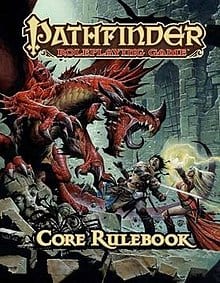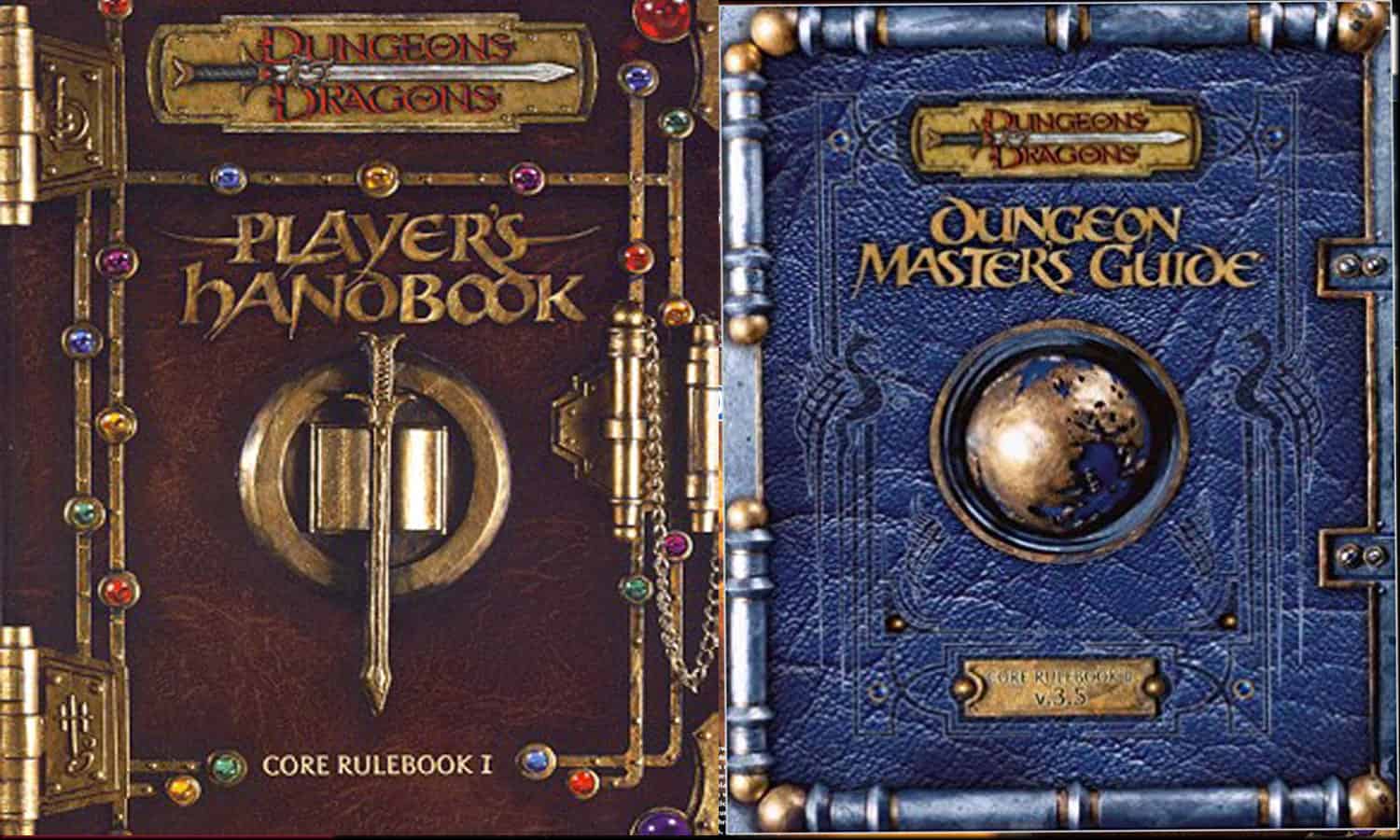There are have been many gaming systems throughout the years. If you started to play around the year 2000, there’s one that stands out more than others. The d20 system was introduced alongside the third edition of Dungeons and Dragons, but it quickly came to dominate the shelves of gaming stores across the road. Taking a look at how this system came to be – and where it eventually went – is a good way to begin to understand how the gaming industry evolved into its current state. You might also enjoy our best 5e modules list.
What is the d20 RPG System?
First off, we need to mention that d20 is a fairly confusing term because it refers to two separate but important concepts in role-playing. The first is the twenty-sided dice, which is also the basis for the system. However, d20 also refers to a very specific type of gaming system developed by Wizards of the Coast and licensed out to a number of different companies.
The d20 system makes use of a 20-sided dice in order to resolve most actions in the game, augmenting the dice roll with the user’s various ability scores.
From here, the rest of the game’s mechanics follow fairly naturally. d20 games still use the standard assortment of gaming dice, but the d20 remains the dice that is used for the vast majority of in-game rolls. It didn’t matter if you were rolling for initiative, to hit in combat, or even just a social roll – you’d use the same dice and the same rules, simplifying the mechanical portion of gameplay for everyone involved. It was an ideal system for beginners, but it still had enough utility that seasoned players became major fans.
The OGL and d20
When most people think of the d20 system, they’re largely thinking of one of two systems the Open Gaming License (OGL) and the d20 Trademark License. The OGL made third-edition D&D rules (which were the basis for the d20 system) a permanently open and usable system on which other games could be based. In theory, a game didn’t even need to be licensed by Wizards of the Coast in order to use this rule set, and the open system persists to this day. It’s still possible for new OGL games to be made, and there’s a thriving industry of games that are at least partially based on this license.
On a practical level, any game making use of the d20 Trademark License was identical to one published under the OGL. The difference between the two is actually a matter of trademark law. If a game was published under the d20 Trademark License, it could make use of Wizards of the Coast’s d20 trademark in order to show that the game was compatible with other games in the system. Unlike the OGL, the d20 system was created with an eye on its eventual expiration and it has indeed been replaced by a new trademark license as of 4th Edition Dungeons and Dragons.
A History of the d20 RPG System
Wizards of the Coast created something new when it bought Dungeons and Dragons. Before the purchase, the common wisdom was that game systems needed to be unique in order to keep their community. Wizards, however, took the stance that it was the D&D brand that had the actual value and that anything that grew the greater role-playing ecosystem would have a positive impact on Dungeons and Dragons. Therefore, it made sense for the company to make it easier for others to purchase games that were compatible with D&D, helping to grow brand recognition while making it easier for players of other games to cross over to the WoTC properties.
Try my AI Tabletop RPG generators...and an extensive library of content!
The Boom
Wizards saw a great deal of early success with the d20 system. It honestly breathed a great deal of life into traditional role-playing games, allowing companies to focus more on making creative settings rather than trying to reinvent the wheel by creating entirely new and incompatible game systems. In fact, dozens of companies managed to jump on the d20 boat right after its launch, some of which would actually continue to use the system even after it ceased having any type of official support.
The d20 boom saw many new games come into play, some of which would go on to excel in a post d20 world. A very successful Star Wars roleplaying game used the d20 system, as did Gamma World. Many companies that had their own proprietary systems even managed to convert some of their games over to d20 in order to bring in new customers. Companies like White Wolf would briefly make use of the system in order to boost flagging sales and buy time while they worked on the next iterations of their own systems.
The d20 boom was also greatly helped by the growth of e-commerce. It’s largely thanks to this system that pdf gaming books started to become the norm, especially as the setting information became so much more important as the fairly simple rules. d20 managed to ride high for about three years until changes in Wizards of the Coast’s policies and some questionable publishing decisions brought down the system.
⚔️ Fantasy RPG Random Tables Books
Make life as a Gamemaster easier…
If you play Dungeons & Dragons, Pathfinder, or other fantasy RPGs, this
RPG random tables series
is packed with encounters, NPCs, treasure, and more. Available in eBook or print—either way, you’ll have a wealth of adventure ideas at your fingertips.
The Bust
d20’s popularity waned for a few reasons. The first blow came thanks to a licensed publisher in 2013. The publishing of the “Book of Erotic Fantasy” caused quite a bit of stir in Wizards, especially since the book used the d20 trademark. The company quickly objected to the publishing, but the internal damage was done – Wizards decided that it would have to start exercising tighter control over who could use the license and how it would be used. As one might expect, this obviously caused many publishers to resent how much control Wizards would have over the properties to which their system was licensed.
The other big blow came from Wizards itself. The publisher updated its D&D 3rd Edition to Edition 3.5, which radically changed some of the rules of the system. This was done with relatively little warning, quickly making some of the partnered properties obsolete. This was easy to weather for those companies that used the OGL, but those who used the d20 Trademark License quickly found the value of their games reduced. It was clear that while the system might help other companies create games more easily, it was really meant to benefit Wizards.
It should be noted that the downfall of d20 also coincided with a glut of games using the system. Players wanted something new, so they looked elsewhere. Some of the games that had formerly used the d20 system started to branch back out, while a number of other systems were either created or started to gain prominence in the community. Like most great things, d20 simply outgrew its reasonable bounds.
The d20 System Today

While d20 might not have stayed at the top, it’s still around today. There are many games (Pathfinder in particularly) that are considered part of a “post-d20” movement. These games tend to make use of a modified version of d20 or its direct successor, keeping a great deal of what players loved about the games and adapting them for changing markets. There are also plenty of games that were created under the OGL that have never found much of a reason to change, still working alongside the same basic rules that were in place at the turn of the millennium.
Of course, the original d20 games haven’t gone anywhere. It’s still relatively easy to find copies of games like 3rd Edition D&D and there are plenty of die-hards who never adapted to the new rules. The gaming community is never quite as quick as the publishers to move on from a rule set, so it’s almost as easy to find a homebrew adaptation of a d20 game as it ever was to find an official version of the game.
Finally, it should be noted that the d20 system is very much alive within the world of D&D. Fourth and Fifth Editions definitely saw some changes, but the d20 system is still at the heart of both. If you loved the system that was put in place around 2000, you’ll still find quite a bit to like here. While there’s not really much news about how Wizards will adapt the rules for the next iteration of D&D, it seems very unlikely that they’ll move away from their core system in any major way.
Legacy of the d20 System
Finally, it should be noted that d20 has a fairly complex legacy. On one hand, it helped to revolutionize the RPG publishing industry and at least indirectly helped to spur on more online publishing. On the other, it helped to create a glut of products that did a lot to damage the industry in the long-term. All in all, though, it’s perhaps most important as a representation of how the gaming industry could manage to work together to make life easier for players. If nothing else, it did help to prove that it’s the game and not the system that is often the most important. If you love Dungeons and Dragons, be sure to check out our list of the best D&D novels of all time and see if you agree or not.










